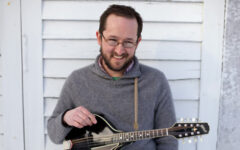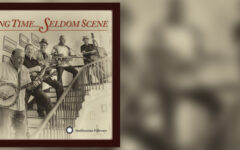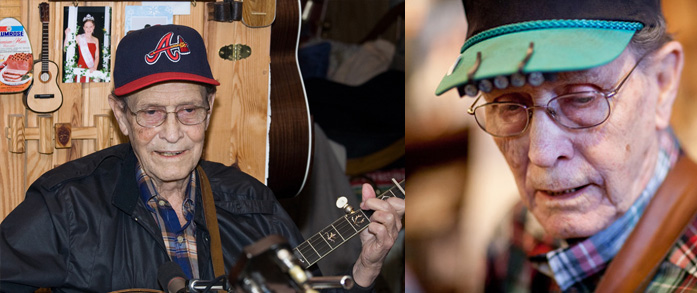
North Carolina banjo player L.W. Lambert passed away on January 23, 2014, at his home in Olin. He was 87 years old and his health had been declining for a while.
Luin Wilford Lambert, Jr was born April 18, 1926, in Summers, Wilkes County, NC. He is known to have had one of the smoothest rolls on the 5-string banjo.
He was enveloped by music from an early age. His father – a farmer and part-time sawyer – was an adept fiddler, guitarist, and two-finger banjo player and his mother, Grace, sang and played the banjo in the clawhammer style.
While Jr was young the Lamberts formed a family group called the Carolina Neighbors and performed regionally.
As a teenager, the budding picker was inspired by Earl Scruggs’ three-finger style of banjo playing and began to further develop his own picking style. In 1947 Lambert re-organized the Carolina Neighbors – with a new line-up – and the group began to perform on a variety of radio programs throughout the Piedmont area. These included a Saturday morning show on WKBC Radio in North Wilkesboro, as members of the cast of Dwight Barker’s WSIC Saturday Nite Jamboree in Statesville, also on WFMX in Statesville, and on a live broadcast show on WPAQ in Mount Airy.
They made their first recording for the Blue Ridge label in 1952.
Around 1955 Lambert joined the Murphy brothers’ band the Blue River Boys. While this ensemble stayed together for about six years, Lambert played with a variety of other top quality musicians, including Ralph Pennington, fresh out of the Stanley Brothers; Charlie Monroe; Jim & Jesse McReynolds and the Virginia Boys; Don Reno; Benny Martin; and budding country singer Bill Anderson; before, in 1968, linking up with the Border Mountain Boys, who featured guitarist Cullen Galyean.
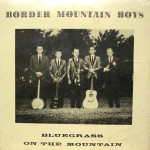 In 1969 the Border Mountain Boys released an LP, Bluegrass on the Mountain, on the Homestead label.
In 1969 the Border Mountain Boys released an LP, Bluegrass on the Mountain, on the Homestead label.
During these years he spent a lot of time freelancing and doing radio and television work, including playing on the Bluegrass in the Morning television show in High Point, North Carolina, (1963 and 1964) in addition to working the radio show at WKBC.
Illness forced Lambert to leave the Border Mountain Boys in 1970.
In 1972, Lambert re-organized the Blue River Boys and the group won 31 of the 34 fiddler’s contests in which they competed during that year, taking home nearly $16,000 in prize winnings.
The Blue River Boys played at festivals all over the north America, including the Lincoln Center, New York City, sharing the bill with performers such as Emmylou Harris, Norman Blake, and the Whites.
A reviewer for the New York Times wrote…………..
“To these ears the portion of the show devoted to L.W. Lambert and the Blue River Boys was the best. Mr. Lambert and his band worked together superbly as a unit, their instrumental solos were inspired and inventive…they played the finest bluegrass this listener has ever heard on a New York stage.”
The group disbanded in 1985. Among those who played in this later version of the Blue River Boys were Terry Baucom and Tim Smith (both playing the fiddle); and Ray Cline (guitar).
In more recent years Lambert has played and recorded with Art Wooten and with Jim Shumate.
The Carolina Neighbors’ recording of The Battle in Korea was entered into the Library of Congress for the Bi-Centennial.
Duke of Drive Terry Baucom remembers ……
“As a teenager, I played fiddle with L.W. Lambert & the Blue River Boys. L.W. was friendly and so easy going and I really enjoyed being around him…so much so, that I ended up just staying at his house a good bit of the time and he always treated me just like family.
He taught me a lot about playing music and harmony singing, but he also taught me a lot about life in general. I can truly say my life is much better because of the time I spent with my friend, L.W. Lambert, and I will surely miss him.”
Lou Reid adds …….
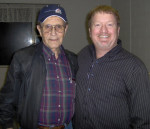 “Lambert lived about three miles from me. I have known of LW since around 1967 or 1968 when we used to play fiddler’s conventions. I would speak to him every time I’d see him at one of the events.
“Lambert lived about three miles from me. I have known of LW since around 1967 or 1968 when we used to play fiddler’s conventions. I would speak to him every time I’d see him at one of the events.
LW was a well-respected musician and bandleader. I filled in on fiddle for a couple of shows with LW and the Blue River Boys back in the early 1970s.
One of the shows was a festival in Garner, North Carolina, east of Raleigh, and the other one was for a Governor’s Ball for Republican Governor Jim Holshouser. At that time that was the biggest show I’d ever played.
When my wife Christy and I were married, I moved right in LW’s backdoor in Olin, North Carolina. We played for a benefit a couple of years ago and we got to pick some together. I asked him if he still played a tune called Beer Barrel Polka that he played almost always at the fiddler’s conventions. It was a difficult tune to play and I had never played it before on the mandolin, but he just kicked it off and we all played the tune. I think it surprised him that I remembered that the Beer Barrel Polka was one of the more popular tunes that he was known to play.
LW was a good family man and a great banjo player and most of all, a wonderful person.”
Here David Holt interviews L.W. Lambert about the Earl Scruggs style banjo. Ray Cline plays the guitar and sings lead on Gone Gone Gone.
Discography
Border Mountain Boys – Bluegrass on the Mountain (Homestead 101, 1969)
L W Lambert and the Blue River Boys
- Natural Grass (United Music World U-0039, 1974)
- The Old, Old Man (Anvil Records RSR-376, 1976)
- Bluegrass Gospel (NDR LW 103, 1980)
Special thanks to Lonnie Webster for the photos of LW Lambert.


